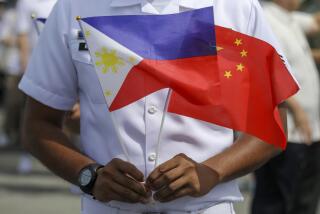Angola Peace Treaty Signed, but Long Conflict Continues
- Share via
LUSAKA, Zambia — Repeating a ritual that twice has failed to end their 19-year-old civil war, Angola’s government and rightist rebels signed a peace treaty Sunday as fighting raged on in their devastated homeland.
UNITA leader Jonas Savimbi and President Jose Eduardo dos Santos did not put their own names on the treaty, heightening fears that it would not stop the war. The rebel leader did not even attend the signing ceremony; aides said he could not leave his bush camp in Angola because of government attacks.
Onlookers including African heads of state cheered as the treaty was signed by Angolan Foreign Minister Venancio de Moura and UNITA Gen. Eugenio Manuvakola in a hot, crowded conference center in Lusaka, the Zambian capital. Dos Santos watched.
Even as they were declaring peace, their war continued. Fighting was reported in central and northern Angola, and aid workers said the rebel-held northern city of Uige was besieged.
The timing of Sunday’s signing also made it far from certain that the two sides will stick to the treaty. They have in previous years declared a cease-fire in November, when the rainy season makes troop movements and air raids impossible, only to resume fighting when the weather improved.
Angola’s war erupted on the eve of independence from Portugal in 1975 and became a Cold War battlefield. Soviet weapons and Cuban troops poured into the Marxist government’s arsenal to fight UNITA rebels armed by the United States and South Africa.
More than 500,000 people have been killed--80,000 of them in the battle last year for the central city of Huambo--and fighting has pushed the oil- and diamond-rich country on Africa’s southwestern coast to the brink of starvation.
Under the treaty, a permanent cease-fire is to take effect Tuesday. A truce was declared last week, but fighting went on. The rebels said all their airfields were under attack Saturday, but the government denied violating the truce.
“All Angolans should forget the suffering of the Angolan conflict and face the future with solidarity and trust,” Manuvakola, the UNITA general, said after signing the peace treaty. Then he embraced De Moura and Dos Santos.
Added Dos Santos: “We are putting the national interests above party rivalries.”
But Angolans were subdued and skeptical.
“Only with the signatures of President Jose Eduardo dos Santos and the leader of the rebels Jonas Savimbi will the cease-fire be respected,” the official Jornal de Angola newspaper said in a front-page article.
At the signing ceremony, the flags of more than 20 African nations ringed the table.
More to Read
Sign up for Essential California
The most important California stories and recommendations in your inbox every morning.
You may occasionally receive promotional content from the Los Angeles Times.













